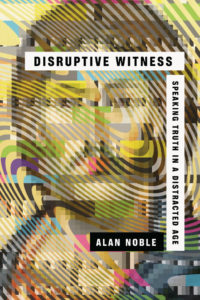 A month or more ago at BookNotes I invited you to pre-order a few forthcoming books that I suggested were important. One, which is now available, is getting lots of fascinating reviews at least in the deeper end of the religious writing pool. Disruptive Witness: Speaking Truth in a Distracted Age is by Alan Noble, published by InterVarsity Press ($16.00) and it is, doubtlessly, an important book that is well worth working through. It doesn’t offer simple spirituality or easy inspiration in a conventional sense but it is deeply spiritual and, if one follows through with its angle of cultural criticism and the action proposals it offers, you will find that it is inspirational in the very best sense.
A month or more ago at BookNotes I invited you to pre-order a few forthcoming books that I suggested were important. One, which is now available, is getting lots of fascinating reviews at least in the deeper end of the religious writing pool. Disruptive Witness: Speaking Truth in a Distracted Age is by Alan Noble, published by InterVarsity Press ($16.00) and it is, doubtlessly, an important book that is well worth working through. It doesn’t offer simple spirituality or easy inspiration in a conventional sense but it is deeply spiritual and, if one follows through with its angle of cultural criticism and the action proposals it offers, you will find that it is inspirational in the very best sense.
That is a big “if”, though, and in a sense, that is what Disruptive Witness is about.
When Jesus said, “let he who has ears to hear, hear” his listeners didn’t have, in Bruce Springsteen’s words, “57 channels and nothin’ on.” That is, the distractions that are everywhere these days (and their eventual emptiness that creates an ennui among us) are baked right into the cake of modernity; that constant distraction that is the very air we breath, keeps us from hearing well.
You get that, I guess, just from looking at this wild, odd cover of a swirling day-glo icon — postmodern Byzantine, right? That’s it!
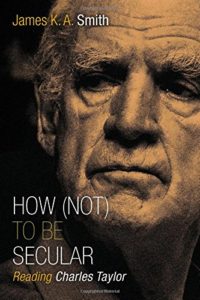 As James K.A. Smith in his brilliant How (Not) to Be Secular: Reading Charles Taylor (Eerdmans; $16.00) explains, the world-class Canadian philosopher Charles Taylor has written profoundly and deeply to show us how the tensions of the modern age and the secularism that it has brought has rendered much of our lives in our era, not to mention our religious sensibilities, shallow, contradictory, and confused. Like the frog in the kettle accommodated to the rising temperatures, we don’t even realize the mess we’re in.
As James K.A. Smith in his brilliant How (Not) to Be Secular: Reading Charles Taylor (Eerdmans; $16.00) explains, the world-class Canadian philosopher Charles Taylor has written profoundly and deeply to show us how the tensions of the modern age and the secularism that it has brought has rendered much of our lives in our era, not to mention our religious sensibilities, shallow, contradictory, and confused. Like the frog in the kettle accommodated to the rising temperatures, we don’t even realize the mess we’re in.
There’s this modern day baggage in our secular age; we are haunted (not fully atheistic) but have echoes of stuff in our heads, a longing, but little resolution. We can’t help but experience things, well, the way the world is these days.
Just for instance, part and parcel of the “social imaginary” (Taylor’s phrase, by which he means something like a worldview) of our times is consumerism. When everything is on sale 24/7 and ubiquitous advertisements appeal to our sense of story and what the good life is supposed to be about, and we can shop even at the push of a button, nearly everything we do becomes a choice to consume (ever hear of the phrase “church shopping”? Isn’t it true that one of our primary identities these days is no longer, say, citizen, but consumer?) That is, the gospel’s saving message and the call to be involved in a local church is heard and experienced as merely the same sort of ad pitch that the car dealers and political parties and porn sites and grocery stores and fashion lines use to sway our wants and capture our wallets with their brands. Everything is mediated and so even those who find themselves attracted to the gospel or a local church think – at least on a subconscious level – that they chose this faith for their own reasons, to enhance their own selves, just like when we buy any other product, and it ends up being about as important, sometimes, as a choice for a kind of soap or a Friday night movie. What kind of faith can develop and mature when we think of Jesus’ grace as a product we bought? Something I liked? Nothing comes to us just as it is and the secularized, pluralizing worldview and background frame of our modern times makes it hard to grapple with notions of real truth and honest faith.
Behind or below this consumerism, where everything has a price and can be purchased by yourself (thank you very much, slam-bam-thank-you-ma’am) is, of course, the idolatry of the self. Since we feel that we live in a mechanistic and “closed” universe, any deep religious feelings we conjure are just there because we chose them, manageable. Charles Taylor calls this the “buffered self” and Noble explains it all very helpfully, although it is still complex. His story about working with different kind of characters at Sears really made it come alive. His coming to realize how some other youth did or didn’t understand the gospel words he was using was also helpful.
This is where Noble starts the book. The first few chapters are a thick and mature overview of Charles Taylor and his monumental A Secular Age. Somewhat like Jamie Smith’s popularization, Alan Noble, too, brings the heady academic jargon of Taylor into more common parlance and helps us see how notions of cross tension and social imaginaries and secularization and consumerism and the buffered self combine to create an ethos and frame of experience that makes living coherently and hearing the gospel plainly just really, really hard. (The easiest, shortest overview of Taylor, by the way, and why he is helpful, chapter five of Timothy Keller’s small Preaching: Communicating Faith in an Age of Skepticism about knowing the context of those who hear our sermons and he explains why knowing a bit about the Taylor thesis will make us wiser Bible preachers or teachers.) We may not even realize how much we’ve breathed the air of “this secular age” and its pressures and styles and forms and attitudes — not just the ideas! – until we read Noble’s descriptions and allow him to remind us how complicated it may be to share God’s goodness and the message of Christ’s Kingdom with others in this distracted age.
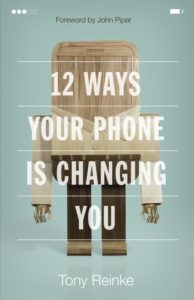
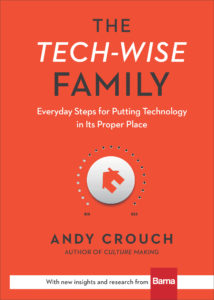 Add to this Noble’s considerable awareness of and candor about how many of us are nearly addicted to our smart phones – I laughed when he says he even uses it in the bathroom – and how literally distracted we are with the beeps and buzzes and notices from our ubiquitous devices. There are many books about this these days, from the practical 12 Ways Your Cell Phone Has Changed You by Tony Reinke to Andy Crouch’s wonderful Tech Wise Family: Everyday Steps for Putting Technology in Its Proper Place to the serious Distracted: The Erosion of Attention in the Coming Dark Age by Maggie Jackson and it is good that Noble plumbs some of the implications of electronic distraction. We all know this is really, really important, but few of us study it, let alone do much about it. I like how Alan calls us to the simple (well, not so simple, after all) task of silence and solitude so we can contemplate and wrestle with ideas. How can we do that when we are so busy, so saturated by constant connection with content, or just “move on” to the next curious thing? Watch this short video to hear Noble nicely explaining this dilemma, and this second one about why giving up tech isn’t an adequate answer. Nice stuff.
Add to this Noble’s considerable awareness of and candor about how many of us are nearly addicted to our smart phones – I laughed when he says he even uses it in the bathroom – and how literally distracted we are with the beeps and buzzes and notices from our ubiquitous devices. There are many books about this these days, from the practical 12 Ways Your Cell Phone Has Changed You by Tony Reinke to Andy Crouch’s wonderful Tech Wise Family: Everyday Steps for Putting Technology in Its Proper Place to the serious Distracted: The Erosion of Attention in the Coming Dark Age by Maggie Jackson and it is good that Noble plumbs some of the implications of electronic distraction. We all know this is really, really important, but few of us study it, let alone do much about it. I like how Alan calls us to the simple (well, not so simple, after all) task of silence and solitude so we can contemplate and wrestle with ideas. How can we do that when we are so busy, so saturated by constant connection with content, or just “move on” to the next curious thing? Watch this short video to hear Noble nicely explaining this dilemma, and this second one about why giving up tech isn’t an adequate answer. Nice stuff.
Noble explains his project in Disruptive Witness forthrightly. Read this carefully:
To understand the contemporary challenge of bearing witness to the truth of the gospel of Jesus Christ, we need to consider our way of life in this distracted age, and what effect it has on our ability to reflect, contemplate, and respond with conviction. With the help of Charles Taylor and others, we will explore what it means to live in a secular age and how this compounds the effects of distraction to create a deep and largely unacknowledged barrier to belief for most people.
A “barrier to belief”?
Wow. That is a notable part of our cultural condition, the framework and background noise which shapes how people lean into and experience life these days. And, again, this isn’t just because of bad ideas or ideological media; our very cultural practices — having so many choices of TV shows or making our own decisions about health care or using Yelp to help us “crowd source” where to eat or vacation, controlling so much with the push of a button – all subtly inform our ways of thinking and evaluating stuff day by day. Including the things we hear about faith and spirituality. Hence, our discipleship – not to mention our efforts to share the gospel with others – is not exactly compromised, but colored, misunderstood, framed a certain way. Like it or not, these are crazy times and with the eye of a literature prof and the awareness of a philosophy geek, Noble offers some keen diagnosis about the distractions and what they to do us and how they may constrict our religious witness in the world.
(And, just for a bit of a spoiler, you should know Dr. Noble got his Masters and PhD in contemporary literature. So he values reading, including modern novels. How ’bout that as a radical solution to some of our problems!)
Okay, so we’re distracted and secularized, missing out on the deepest transforming spiritual power that comes, in part, from a fully Christian worldview that is laden with passion and wonder and goodness and beauty and more. How in the world do we more deeply experience – and more importantly, help our neighbors and the rising generations – learn to encounter wonder? How do we even find time and space to ponder things? What conditions might help us be more faithful and fruitful in this buffered, secular age? How can we help people who are “searching for visions of fullness?” And what is fullness, anyway? What is a deep, good, life?
 The second half of this ambitious book offers three large meditations on strategies we can use to resist, to disrupt, the distraction and secularizing ethos of our times. To make a way through the noise towards the fullness of life. He offers deep, philosophical notions and then backs them up with theological insights and proposes ordinary practices that emerge from his own efforts and stories. In a way, this is the biggest strategy of all – we simply must be more attentive to the real, the down to Earth, nurturing virtue by way of daily practices. We have to do stuff well, and show how it points beyond ourselves to the God who is there, in a world that is loved. How do we become agents of that kind of disruption?
The second half of this ambitious book offers three large meditations on strategies we can use to resist, to disrupt, the distraction and secularizing ethos of our times. To make a way through the noise towards the fullness of life. He offers deep, philosophical notions and then backs them up with theological insights and proposes ordinary practices that emerge from his own efforts and stories. In a way, this is the biggest strategy of all – we simply must be more attentive to the real, the down to Earth, nurturing virtue by way of daily practices. We have to do stuff well, and show how it points beyond ourselves to the God who is there, in a world that is loved. How do we become agents of that kind of disruption?
DISRUPTIVE PERSONAL, CONGREGATIONAL, and CULTURAL PRACTICES
There are three parts in the second half and I cannot here do justice to these complex and finally practice proposals. There are three areas he explores that, he believes, we as God’s people, as Christ’s church, are going to have to offer some counter-narrative so that others can actually make sense of and be attracted to the message of God’s goodness. We will need these strategies of resistance if we are to bear fruit in some ways that will help erode the distraction and break through the brass ceiling of our secular age.
First he looks at disruptive personal practices, followed by a chapter on church practices, and finally, ways to be disruptive in our cultural participation. He does not mean wildly acting up and protesting and such, so don’t misunderstand his use of “disruption.” He is subtle and thoughtful, pushing towards practices that can subvert the negative tendencies of our cultural assumptions and habits.
As I’ve said, he has three separate chapters on fruitful disruptive practices in our personal lives, in our congregational lives and in our public lives. There’s plenty to think about a lots to try out. (And lots to discuss with others, so you really should consider buying more than one since your going to have to talk over this stuff with some friends.)
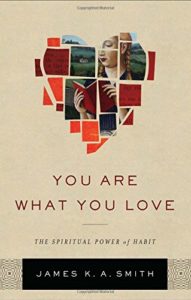
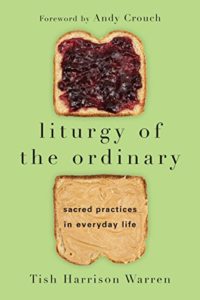 In a way, this approach is very much like what James K.A. Smith does in the urgent You Are What You Love: The Spiritual Power of Habit and what Tish Harrison Warren does in her lovely Liturgy of the Ordinary: Sacred Practices in Everyday Life. This book is a bit more dense than those, but if you’ve read those, this maybe should come next.
In a way, this approach is very much like what James K.A. Smith does in the urgent You Are What You Love: The Spiritual Power of Habit and what Tish Harrison Warren does in her lovely Liturgy of the Ordinary: Sacred Practices in Everyday Life. This book is a bit more dense than those, but if you’ve read those, this maybe should come next.
One fun thing and personally reward thing I’ll share – Noble is convinced (following Taylor and Smith) that for our sakes, yes, but, more, for our neighbors’s sakes, we should learn to live “allusively” (a phrase he gets from Calvin Seerveld’s amazing, allusive work Rainbows for the Fallen World which, if you will allow me this brag, we 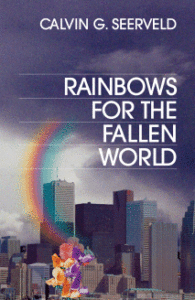 sold to him.) That is, there is a creative/artistic side to our human experience and the use of our imaginations – so often captured by popular tastes and popular culture – need to be redeemed and deepened so that we can be more colorful and curious. I hardly know any book – even those that are written about aesthetics and the arts – that draws on Seerveld’s Rainbows as much as one of the chapters in this book does. Noble is wise to show that this imaginative way of living with greater attention to the arts and daily aesthetics helps us take in more of life as we should, but also to bear witness to God’s hopeful, richly human, wholesome ways in this world. Noble’s part about beauty is very, very nicely done.
sold to him.) That is, there is a creative/artistic side to our human experience and the use of our imaginations – so often captured by popular tastes and popular culture – need to be redeemed and deepened so that we can be more colorful and curious. I hardly know any book – even those that are written about aesthetics and the arts – that draws on Seerveld’s Rainbows as much as one of the chapters in this book does. Noble is wise to show that this imaginative way of living with greater attention to the arts and daily aesthetics helps us take in more of life as we should, but also to bear witness to God’s hopeful, richly human, wholesome ways in this world. Noble’s part about beauty is very, very nicely done.
Further, that he ends the book with an extended reflection on Cormac McCarthy’s disturbing, important novel, The Road, reminds us that this is serious stuff, this longing for beauty in a fallen world. Wow.
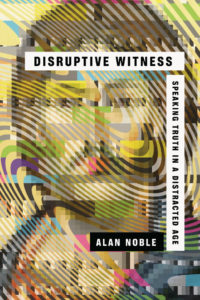 And so, we are thrilled to once again commend to you a serious summer read, a book of cultural analysis and deft critique of the forces of modernity and post-modernity, that, while slogging through some serious stuff, is still loaded with brilliant ideas and practical suggestions. We commend this book to help you and yours thinking intentionally about the nature of our witness in this hot-wired, saturated age.
And so, we are thrilled to once again commend to you a serious summer read, a book of cultural analysis and deft critique of the forces of modernity and post-modernity, that, while slogging through some serious stuff, is still loaded with brilliant ideas and practical suggestions. We commend this book to help you and yours thinking intentionally about the nature of our witness in this hot-wired, saturated age.
As Karen Swallow Prior says, Alan Noble is “asking all the right questions and leading us to better answers.”
HERE ARE 10 MORE BOOKS TO SUPPLEMENT
DISRUPTIVE WITNESS: SPEAKING TRUTH IN A DISTRACTED AGE.
I trust I’m not the only one that is often reading several books at the same time. And often, they are paired intentionally. I’m currently slogging through a chapter a night of the magisterial, hefty, fascinating and sometimes funny bit of cultural critique by the National Review wild man Jonah Goldberg, The Suicide of the West: How the Rebirth of Tribalism, Populism, Nationalism, and Identity Politics Is Destroying American Democracy. That he doesn’t cite Taylor is regrettable, but it is a remarkable genealogy of the ideas and habits of heart that have shaped American views of democracy and capitalism. Intellectual history is fascinating to help us see how we got where we are…
So come on, buy a couple of books, read them simultaneously or back to back, and get thinking about how you can become disruptive in this crazy world.
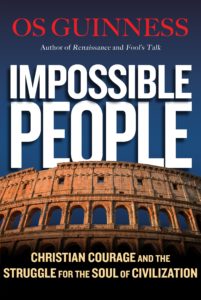 Impossible People: Christian Courage and the Struggle for the Soul of Civilization Os Guinness (IVP) $20.00 I have said before that this is a great way to understand our modern and postmodern era; it is a one-volume lesson in discerning and urgent cultural analysis. The always incisive Guinness (with his PhD degree studying the work of sociologist Peter Berger) brings out many of the themes he has explored before – how, just for instance, speed and choice and change have disrupted traditional ways of knowing and believing. He shows how modernity itself has eroded the very notion of authority. Of course he explores how we in the evangelical churches, especially, have too often attempted to link the gospel to marketing, the growth of technology, and such. Have these things come back to haunt us? Have forces we’ve too often ignored actually displaced our first love of the gospel itself? What will it take to be bold, principled, people who will rise up and say no to unfaithful compromise and unhelpful patterns? I have written before in greater detail why I think this is a very important book, sounding an alarm as it does, and read it now would be a another way to understand the need for what Noble calls “disruptive practices” in our personal, church, and cultural lives. If you’re reading Alan Noble, you should (seriously) buy this, too!
Impossible People: Christian Courage and the Struggle for the Soul of Civilization Os Guinness (IVP) $20.00 I have said before that this is a great way to understand our modern and postmodern era; it is a one-volume lesson in discerning and urgent cultural analysis. The always incisive Guinness (with his PhD degree studying the work of sociologist Peter Berger) brings out many of the themes he has explored before – how, just for instance, speed and choice and change have disrupted traditional ways of knowing and believing. He shows how modernity itself has eroded the very notion of authority. Of course he explores how we in the evangelical churches, especially, have too often attempted to link the gospel to marketing, the growth of technology, and such. Have these things come back to haunt us? Have forces we’ve too often ignored actually displaced our first love of the gospel itself? What will it take to be bold, principled, people who will rise up and say no to unfaithful compromise and unhelpful patterns? I have written before in greater detail why I think this is a very important book, sounding an alarm as it does, and read it now would be a another way to understand the need for what Noble calls “disruptive practices” in our personal, church, and cultural lives. If you’re reading Alan Noble, you should (seriously) buy this, too!
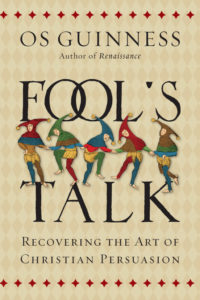 Fool’s Talk: Recovering the Art of Christian Persuasion Os Guinness (IVP) $22.00 This is a remarkable, one-of-a-kind study which we raved about here at BookNotes when it came out in 2015. Considered by some a magnum opus, it was 40 years in the making, drawing on broad and historically informed cultural studies, incisive insights about apologetics, and a mash-up of three of Guinness’s most decisive influences – C.S. Lewis, Francis Schaeffer, and Peter Berger. Granted, as Alan Noble explains (and as Os himself admits) the times are complex, the ideas and the structures and habits of culture often a large obstacle, but we can still learn how best to persuade. There is an art to learning these ways of persuasion, and Guinness has thought about this for a lifetime. Highly recommended. (By the way, just a parenthetical shout out, here: we expect any day his brand new revised and expanded 20th anniversary edition of The Call: Finding and Fulfilling Your Greatest Purpose, which remains one of my all time favorite books.)
Fool’s Talk: Recovering the Art of Christian Persuasion Os Guinness (IVP) $22.00 This is a remarkable, one-of-a-kind study which we raved about here at BookNotes when it came out in 2015. Considered by some a magnum opus, it was 40 years in the making, drawing on broad and historically informed cultural studies, incisive insights about apologetics, and a mash-up of three of Guinness’s most decisive influences – C.S. Lewis, Francis Schaeffer, and Peter Berger. Granted, as Alan Noble explains (and as Os himself admits) the times are complex, the ideas and the structures and habits of culture often a large obstacle, but we can still learn how best to persuade. There is an art to learning these ways of persuasion, and Guinness has thought about this for a lifetime. Highly recommended. (By the way, just a parenthetical shout out, here: we expect any day his brand new revised and expanded 20th anniversary edition of The Call: Finding and Fulfilling Your Greatest Purpose, which remains one of my all time favorite books.)
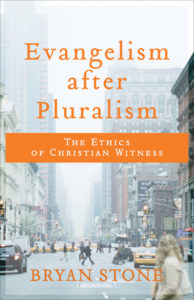 Evangelism After Pluralism: The Ethics of Christian Witness Bryan Stone (Baker Academic) $21.99 We have oodles of books about how better to share one’s faith and wish we sold more Despite the good and helpful social analysis offering in books like the Alan Noble (above) we still need to keep trying to talk face to face to people about things that matter most This remarkable volume, though, is less a practical “how to” do better evangelism, but a rich and deep study of — as Noble asks — how to even think about evangelism given what we know about communication in “the secular age” and the buffered nature of our selves. Stone has read his Taylor and any other deep cultural critics and he has drunk wisely from the wells of some of our best mainline denominational thinkers — from George Lindbeck to Rowan Williams to Lamin Sanneh to Kathyrn Tanner. I like his counter-cultural posture (citing early church fathers and mothers and modern radical saints like Dorothy Day.) He cites my hero Ron Sider and asks seriously what embodied Christian witness looks like in an era such as ours. Stone is associate dean for academic affairs and E. Stanley Jones Professor of Evangelism at the Boston University School of Theology. You may recall his book Evangelism After Christendom, which also would be a good, serious read for those exploring foundational stuff about worldviews and culture and sharing the gospel well. For what it is worth, not surprisingly, Evangelism After Pluralism has rave reviews on the back from Will Willimon and Stanley Hauerwas as well as rising scholars such as Joon-Sik Park (of Methodist Theological School in Ohio) and Duke’s Laceye Warner, who calls it a “must-read.”
Evangelism After Pluralism: The Ethics of Christian Witness Bryan Stone (Baker Academic) $21.99 We have oodles of books about how better to share one’s faith and wish we sold more Despite the good and helpful social analysis offering in books like the Alan Noble (above) we still need to keep trying to talk face to face to people about things that matter most This remarkable volume, though, is less a practical “how to” do better evangelism, but a rich and deep study of — as Noble asks — how to even think about evangelism given what we know about communication in “the secular age” and the buffered nature of our selves. Stone has read his Taylor and any other deep cultural critics and he has drunk wisely from the wells of some of our best mainline denominational thinkers — from George Lindbeck to Rowan Williams to Lamin Sanneh to Kathyrn Tanner. I like his counter-cultural posture (citing early church fathers and mothers and modern radical saints like Dorothy Day.) He cites my hero Ron Sider and asks seriously what embodied Christian witness looks like in an era such as ours. Stone is associate dean for academic affairs and E. Stanley Jones Professor of Evangelism at the Boston University School of Theology. You may recall his book Evangelism After Christendom, which also would be a good, serious read for those exploring foundational stuff about worldviews and culture and sharing the gospel well. For what it is worth, not surprisingly, Evangelism After Pluralism has rave reviews on the back from Will Willimon and Stanley Hauerwas as well as rising scholars such as Joon-Sik Park (of Methodist Theological School in Ohio) and Duke’s Laceye Warner, who calls it a “must-read.”
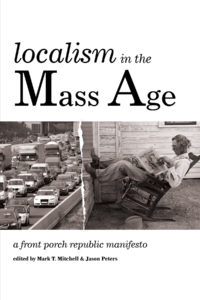 Localism in a Mass Age: A Front Porch Republic Manifesto edited by Mark T. Mitchell & Jason Peters (Front Porch Republic Books) $32.00 This fabulously interesting and curious collection takes more time than I’ve got here, now, to explain. In a sense, the title evokes much – the “front porch republic” is a movement that is, mostly, localist and conservative. (That is, they want to conserve, so they tend to be cranky about suburban sprawl and big Wal Marts and global wars and utopian dreams.) Although Wendell Berry isn’t in here, his spirit hovers near several of the chapters.
Localism in a Mass Age: A Front Porch Republic Manifesto edited by Mark T. Mitchell & Jason Peters (Front Porch Republic Books) $32.00 This fabulously interesting and curious collection takes more time than I’ve got here, now, to explain. In a sense, the title evokes much – the “front porch republic” is a movement that is, mostly, localist and conservative. (That is, they want to conserve, so they tend to be cranky about suburban sprawl and big Wal Marts and global wars and utopian dreams.) Although Wendell Berry isn’t in here, his spirit hovers near several of the chapters.
It’s a big book of 30 chapters and authors such as the fantastic, fun Bill Kauffman (of Muckdog Gazette) and the now well-known Patrick Deneen (even former President Obama is reading Why Liberalism Failed) are representative of the different tones and styles and views. There are several scholars from well- known evangelical Christian colleges, each calling in their own way for us to pay attention and be stewards of our places and thereby offering an alternative vision to the tired old left/right distinction. I like the blurbs on the back by the always-feisty new urbanist, James Howard Kunstler and the always-lovely memoirist Scott Russell Sanders. I do not know what Alan Noble thinks about decentralization or cultural regionalism or other localist notions presented here but Localism in a Mass Age is a profound call to renew families and deepen relationships and work for economies of scale which, religious or not (and some essays clearly are) seem to be practices of disruption to our blandly secularized culture. Front Porchers just might have something to say to this vision of disruption that Noble invites us to, and I wanted to suggest this manifesto anthology as a way to discover other ways to develop a sensible, local lifestyle consistent with his hope of undoing the spirit of the age.
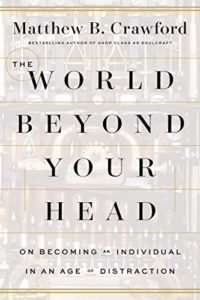 The World Beyond Your Head: On Becoming an Individual in an Age of Distraction Matthew Crawford (Farrar, Straus, Giroux) $16.00 From time to time I enjoy reminding people about Crawford’s first big book, Shop Class as Soul Craft which was, although a bit heady, a call to rediscover the joys of working with one’s hands, of his own departure from a white collar think-tank to starting his own motorcycle repair shop. What do we lose when we gush about the information age or digital culture and defund shop classes and trade schools? The World Beyond Your Head continues these questions, offering more vintage Crawford, investigating the challenging of mastering crafts and how some workers have done well in taking up their jobs as vocations. Of course, as with Noble, is has the word “distraction” in the title, although he may be reflecting a bit more deeply than Noble on kinds of distractions we encounter. The World Beyond Your Head is in a way a study about digital culture vs. “real world” work and how abstraction messes with our minds. Does learning to pay attention to and have focus upon our bodies (by way of manual work) have anything to do with Alan Noble’s “disruption” challenges in his Disruptive Witness: Speaking the Truth in a Distracted Age? What role does embodiment play in Noble’s vision? How about a dose of Crawford, here, who says, “attention sculpts the self”? Do you recall that quotable line from James K.A. Smith when he insists that “the things we do, do things to us”? Do you know Nicholas Carr’s elegant but alarming books The Shallows: What the Internet is Doing to Our Brains and The Glass Cage: How Our Computers Are Changing Us? Noble is truly concerned about this stuff and I wish he’d have engaged Matthew Crawford as a conversation partner.
The World Beyond Your Head: On Becoming an Individual in an Age of Distraction Matthew Crawford (Farrar, Straus, Giroux) $16.00 From time to time I enjoy reminding people about Crawford’s first big book, Shop Class as Soul Craft which was, although a bit heady, a call to rediscover the joys of working with one’s hands, of his own departure from a white collar think-tank to starting his own motorcycle repair shop. What do we lose when we gush about the information age or digital culture and defund shop classes and trade schools? The World Beyond Your Head continues these questions, offering more vintage Crawford, investigating the challenging of mastering crafts and how some workers have done well in taking up their jobs as vocations. Of course, as with Noble, is has the word “distraction” in the title, although he may be reflecting a bit more deeply than Noble on kinds of distractions we encounter. The World Beyond Your Head is in a way a study about digital culture vs. “real world” work and how abstraction messes with our minds. Does learning to pay attention to and have focus upon our bodies (by way of manual work) have anything to do with Alan Noble’s “disruption” challenges in his Disruptive Witness: Speaking the Truth in a Distracted Age? What role does embodiment play in Noble’s vision? How about a dose of Crawford, here, who says, “attention sculpts the self”? Do you recall that quotable line from James K.A. Smith when he insists that “the things we do, do things to us”? Do you know Nicholas Carr’s elegant but alarming books The Shallows: What the Internet is Doing to Our Brains and The Glass Cage: How Our Computers Are Changing Us? Noble is truly concerned about this stuff and I wish he’d have engaged Matthew Crawford as a conversation partner.
Here is how the publisher writes about this remarkable book:
We often complain about our fractured mental lives and feel beset by outside forces that destroy our focus and disrupt our peace of mind. Any defense against this, Crawford argues, requires that we reckon with the way attention sculpts the self.
Crawford investigates the intense focus of ice hockey players and short-order chefs, the quasi-autistic behavior of gambling addicts, the familiar hassles of daily life, and the deep, slow craft of building pipe organs. He shows that our current crisis of attention is only superficially the result of digital technology, and becomes more comprehensible when understood as the coming to fruition of certain assumptions at the root of Western culture that are profoundly at odds with human nature.
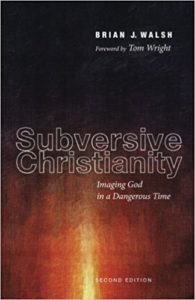 Subversive Christianity: Imaging God in a Dangerous Time Brian Walsh (Wipf & Stock) $17.00 I know you know that I regularly suggest reading Walsh. From his early The Transforming Vision and Truth Is Stranger Than It Used to Be (co-authored with Richard Middleton) to a deep study of place and mobility (Beyond Homelessness: Christian Faith in a Culture of Displacement, co-authored with Steven Bouma-Prediger) through his study of Bruce Cockburn as a way to think about imagination and the arts, to the Wine Without Breakfast Bible studies and worship litanies (St. John Before Breakfast and Habakkuk Before Breakfast) to his must-read Colossians Remixed: Subverting the Empire (co-authored with his Biblical scholar/organic farmer and bio-regional activist wife, Sylvia Keesmaat) we see over and over in his work a deeply Biblical world and life vision that necessarily says no to the dysfunctional ways of the culture (and the powers that be) when they are in opposition to a Biblically-informed vision of flourishing, gracious love and justice, and care for all of creation. Walsh preaches the Bible with breathtaking adeptness, hearing the echoes and connecting the dots and knows economics and philosophy; he writes about the arts and ancient archeology; he knows homeless folks and hangs out with the marginalized even when he’s writing chapters in books about or with other Biblical scholars (such as his friend N.T. Wright.) Brian is in many ways one of my mentors and a thoughtful example of ways to be deeply rooted – radical, that is – and subversive against the idols and ideologies of the culture. I wish I had his Bible knowledge, his relentless passion, and his guts.
Subversive Christianity: Imaging God in a Dangerous Time Brian Walsh (Wipf & Stock) $17.00 I know you know that I regularly suggest reading Walsh. From his early The Transforming Vision and Truth Is Stranger Than It Used to Be (co-authored with Richard Middleton) to a deep study of place and mobility (Beyond Homelessness: Christian Faith in a Culture of Displacement, co-authored with Steven Bouma-Prediger) through his study of Bruce Cockburn as a way to think about imagination and the arts, to the Wine Without Breakfast Bible studies and worship litanies (St. John Before Breakfast and Habakkuk Before Breakfast) to his must-read Colossians Remixed: Subverting the Empire (co-authored with his Biblical scholar/organic farmer and bio-regional activist wife, Sylvia Keesmaat) we see over and over in his work a deeply Biblical world and life vision that necessarily says no to the dysfunctional ways of the culture (and the powers that be) when they are in opposition to a Biblically-informed vision of flourishing, gracious love and justice, and care for all of creation. Walsh preaches the Bible with breathtaking adeptness, hearing the echoes and connecting the dots and knows economics and philosophy; he writes about the arts and ancient archeology; he knows homeless folks and hangs out with the marginalized even when he’s writing chapters in books about or with other Biblical scholars (such as his friend N.T. Wright.) Brian is in many ways one of my mentors and a thoughtful example of ways to be deeply rooted – radical, that is – and subversive against the idols and ideologies of the culture. I wish I had his Bible knowledge, his relentless passion, and his guts.
I wonder how Alan Noble’s project – carefully spelling out practices to disrupt Taylor’s secular age and buffered self and obsession with social media accounts – might have sounded a bit different if he would have been informed by the books of Brian Walsh? I suggest this one, Subversive Christianity, for starters, as it is a collection of several lengthy essays deconstructing contemporary culture and evangelicalism compromises with it, as well as powerfully calling out of modernist thinkers who make an idol out of growth and so-called progress and bigness and success and power. He does more than draw on Jeremiah, he nearly embodies him! I think we need this poignant, powerful call to subvert the idols and to be used by God to see alternative visions of life and hope held up and lived out, and Subversive helps us do just that. His important chapter about imaging God and his several that draw on Brueggemann’s Prophetic Imagination (and, subsequently, the role of grief and lament) are essential for those of us that want to struggle with what it means to navigate fidelity in the midst of the current empire and the secular age. Subversive Christianity is a book you should know; you will learn much and be stretched. It may be unlike most authors you are reading. It will give you courage. It is a small book that you will never forget.
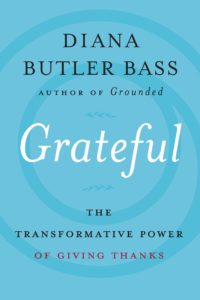 Grateful: The Transformative Power of Giving Thanks Diana Butler Bass (HarperOne) $26.99 We recently did two reviews of this at BookNotes, one rather long, so I hope you know that we are fans, even if I wasn’t confident, at first, that this book would be that interesting to me or important for serving the cause of of the flourishing of the common good. We’re very glad to report that it is exceptionally well-written, deep, good stuff, and that we think it deserves the acclaim that it has been getting. Grateful is a fabulous, inspiring book to read over the summer. The whole business of happiness and gratitude and such is being researched by scientists and while Diana is a social scientist and spiritual writer, she does discuss some of the brain studies data and such. It is certainly timely and a topic many are interested in.
Grateful: The Transformative Power of Giving Thanks Diana Butler Bass (HarperOne) $26.99 We recently did two reviews of this at BookNotes, one rather long, so I hope you know that we are fans, even if I wasn’t confident, at first, that this book would be that interesting to me or important for serving the cause of of the flourishing of the common good. We’re very glad to report that it is exceptionally well-written, deep, good stuff, and that we think it deserves the acclaim that it has been getting. Grateful is a fabulous, inspiring book to read over the summer. The whole business of happiness and gratitude and such is being researched by scientists and while Diana is a social scientist and spiritual writer, she does discuss some of the brain studies data and such. It is certainly timely and a topic many are interested in.
But mostly, Grateful is a visionary call to see life differently, to embrace a vision of abundance, of life being a gift, of living not out of rigid and demanding reciprocity but of grace. What kind of a culture, she wonders, might we have if we had the eyes, the heart, to be grateful?
Well, I want to put this in conversation with Charles Taylor and Jamie Smith’s stuff about practices and, now, Alan Noble as well with his call to be “disruptive” of the secular age. In what ways might Diana’s proposed practices of living into gratitude and building a culture of abundance – dearly missing within late modern capitalism that is experience as consumerism – underscore or highlight the allusive and aesthetic sort of lifestyle Noble suggests? I think these two books would pair well together and although they have different spiritual orientations (she is a progressive Episcopalian with and interest in politics and church and he is a moderate Baptist with an interest in politics and liturgy) I think they would compliment each other nicely. In fact, in Noble’s section on better evangelical approaches to cultural engagement in which he talks about reading novels and hosting book clubs he writes nicely about how some stories can teach us to be attentive to gratitude and beauty. Nice.
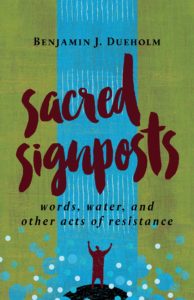 Sacred Signposts: Words, Water, and Other Acts of Resistance Benjamin J. Dueholm (Eerdmans) $16.99 I so, so want to recommend this and admit from the start that it deserves its own long review; I can only suggest a bit about it now. Dueholm is a Lutheran pastor who is also skilled as a great writer – his sentences are truly a delight to read – while his theological vision is provocative and interesting and generative. Here, as you might guess, he is showing how the church’s most elemental practices are themselves subversive to the secularized culture in which we live. Had this book been out previously (it came just this week) Alan Noble might have used it for his own chapter on disruptive practices in the local congregation.
Sacred Signposts: Words, Water, and Other Acts of Resistance Benjamin J. Dueholm (Eerdmans) $16.99 I so, so want to recommend this and admit from the start that it deserves its own long review; I can only suggest a bit about it now. Dueholm is a Lutheran pastor who is also skilled as a great writer – his sentences are truly a delight to read – while his theological vision is provocative and interesting and generative. Here, as you might guess, he is showing how the church’s most elemental practices are themselves subversive to the secularized culture in which we live. Had this book been out previously (it came just this week) Alan Noble might have used it for his own chapter on disruptive practices in the local congregation.
I’m part way through Sacred Signposts and really enjoying it. I agree with Kaya Oakes who says “Benjamin Dueholm elegantly and thoughtfully moves us through a Christianity of resistance to our own torpor and into a Christianity of embodiment.” See why I want to pair it with Alan Noble’s Disruptive Witness?
Here is partially how Dueholm describes what he’s doing in this lovely, provocative volume: “These Christian practices,” he says:
represent and enact a different vision of what it means to be good, or even to be human, from the ones offered by our prominent political and economic ideologies. Christians have names for this different vision. We call it ‘the Kingdom of God’ or ‘the beloved community.’ And it is realized, in ways that are small and fleeting but also urgent and poignant, every time we gather around our holy possessions.
Here is some of what Eerdmans has said about it:
In this book Dueholm unpacks Christianity’s seven “holy possessions,” which function as signposts–words, water, bread and wine, confession and forgiveness, ministry, worship, and suffering–and he offers a visionary account of the critical, radical, life-affirming role that faith can play in a secular, post-Christian world.
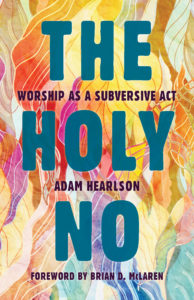 The Holy No: Worship as a Subversive Act Adam Hearlson (Eerdmans) $24.00 With this boldly subversive, nay-saying title, you can see why I might want to commend this alongside the profound study of the secular age by Alan Noble. Hearlson, a UCC pastor, puzzles out a bit about worship and liturgy as counter-cultural and formative in ways to help us resist distraction; good worship should help us understand God’s transformative work in our lives, and help us bear witness well in the world. But to do that, we must be resistant. How ‘bout a book that just shouts it – The Holy No!
The Holy No: Worship as a Subversive Act Adam Hearlson (Eerdmans) $24.00 With this boldly subversive, nay-saying title, you can see why I might want to commend this alongside the profound study of the secular age by Alan Noble. Hearlson, a UCC pastor, puzzles out a bit about worship and liturgy as counter-cultural and formative in ways to help us resist distraction; good worship should help us understand God’s transformative work in our lives, and help us bear witness well in the world. But to do that, we must be resistant. How ‘bout a book that just shouts it – The Holy No!
Well, I’m not sure this is what Alan Noble means, and the book is more academically rooted and studious than I’d wished. Although the popular and often very inspiring Brian McLaren says it is “as brilliant an exploration of the act of worship I’ve ever seen” I found it not as arresting as I thought it might be, in part because it is a demanding read. But, whew, Hearlson’s on to something here and this is well worth working through, especially for those involved in mainline denominational worship contexts who appreciate this teasing out of the political implications of our gatherings and rites. Do good rites lead to equal rights?
And Rev. Hearlson does draw on remarkable sources – some predictable (the feminist Mud Flower Collective, Max Harris’s study of feast of fools called Sacred Folly, Alice Walker, bell hooks) and some which delightfully surprised me (he talks about Levon Helm from The Band, Alan Lomax field recordings from the deep South, even the rock band Fugazi.) His scholarly background includes significant engagement with Pierre Bourdieu the fieldwork sociologist. (Oh I wish he’d have cited Fieldwork in Theology: Exploring the Social Context of God’s Work in the World by Christian Scharen, edited by James Smith.) Do a bit of ethnography to bolster his case makes sense; Hearlson is helping us see the implications of worship curated to be a prophetic cry so studying how things work on the ground is important. Besides the many odd-ball sources, he draws on Barth and, more so, Moltmann and a few high Catholic liturgy scholars and lots from the black church tradition as well. I can report happily that he cites Jeremy Begbie on music, which never hurts. Do you remember ‘Red’ from The Shawshank Redemption? He shows up too. Maybe hearing this kind of frank, serious stuff could supplement Alan Noble’s Disruptive Witness.
So, left-wing and academic as it is, The Holy No is a good read; stimulating and challenging for some of us, I’m sure. Hearlson is a UCC pastor and has also taught at mainline seminaries so there’s lots of talk about power structures and solidarity with the marginalized and worship as political practice. Good blurbs on the back read like a who’s who in homiletics – Luke Powery, Thomas Long, Cleophus LaRue, Liz Theoharis. Rev. Hearlson insists that preaching, music, sacraments and art can “sabotage oppressive structures of the world for the sake of the gospel” and that Christians can say a “Holy No to oppression and injustice through our worship.”
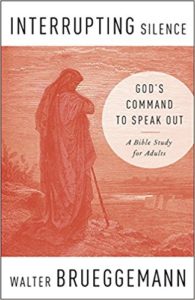 Interrupting Silence God’s Command to Speak Out: A Bible Study for Adults Walter Brueggemann (WJK) $14.00 Walt Brueggemann is very important to me for many reasons, but in the context of the theme of this newsletter — riffing off of the insights of Alan Noble’s Disruptive Witness —I might note that Brueggemann is not only a master Old Testament scholar and evocative Bible teacher, but he is exceptionally well read, especially in the social sciences and history and in what we might call cultural studies. So all of his rich Scriptural teaching is somewhat shaped by worldviewish vision and cultural critique. (Indeed, his old, extraordinary, brief book The Bible Makes Sense starts with two “bad” acculturated views of the Bible, showing ways the left-brain, establishment rationalists and the lefty, counter-cultural romantics each misread the very meaning of the Biblical drama which cannot be tamed and dare not be turned into an ideology of the right or the left.) Anyway, this new pithy book by Brueggemann offers eight fairly short but potent Bible reflections — one from Exodus, one from Amos, one on a few verses from Psalm 32, and five New Testament texts, each with provocative study questions for a serious adult class. Each chapter runs about 10 profound, pages. Brueggemann-esque pages, that is, so you’re getting your money’s worth.
Interrupting Silence God’s Command to Speak Out: A Bible Study for Adults Walter Brueggemann (WJK) $14.00 Walt Brueggemann is very important to me for many reasons, but in the context of the theme of this newsletter — riffing off of the insights of Alan Noble’s Disruptive Witness —I might note that Brueggemann is not only a master Old Testament scholar and evocative Bible teacher, but he is exceptionally well read, especially in the social sciences and history and in what we might call cultural studies. So all of his rich Scriptural teaching is somewhat shaped by worldviewish vision and cultural critique. (Indeed, his old, extraordinary, brief book The Bible Makes Sense starts with two “bad” acculturated views of the Bible, showing ways the left-brain, establishment rationalists and the lefty, counter-cultural romantics each misread the very meaning of the Biblical drama which cannot be tamed and dare not be turned into an ideology of the right or the left.) Anyway, this new pithy book by Brueggemann offers eight fairly short but potent Bible reflections — one from Exodus, one from Amos, one on a few verses from Psalm 32, and five New Testament texts, each with provocative study questions for a serious adult class. Each chapter runs about 10 profound, pages. Brueggemann-esque pages, that is, so you’re getting your money’s worth.
Perhaps these rich reminders from God’s Word will help us find insight and courage and wisdom to be able to break the silence and speak well, faithfully, into the culture of our times.
Here’s how the publisher puts it on the back cover:
Silence is a complex matter It can refer to awe before unutterable holiness, but it can always refer to the coercion where some voices are silenced in the interest of control by the dominant voices. It is the latter voices that Walter Brueggemann explores, urging us to speak up in situations of injustice
Interrupting Silence illustrates that the Bible is filled with stories where marginalized people break repressive silence and speak against it Examining how maintaining silence allows the powerful to keep control, Brueggemann motivates readers to consider situations in their lives where they need to either interrupt silence…
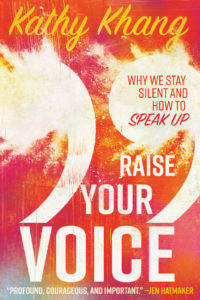 In telling you about Interrupting Silence I must note that I’m reminded of a brand new book I spoke about in my little video for last week’s BookNotes — Kathy Khang’s Raise Your Voice: Why We Stay Silent and How to Speak Up (IVP; $16.00.) We all can use some extra help in learning when and why and how to speak up, and Ms. Khang not only reminds us to use our voice with (as Rachel Held Evans puts it) “holy force” but also has done some good work herself exploring the social, cultural, and familial forces the sometimes intimidate us.
In telling you about Interrupting Silence I must note that I’m reminded of a brand new book I spoke about in my little video for last week’s BookNotes — Kathy Khang’s Raise Your Voice: Why We Stay Silent and How to Speak Up (IVP; $16.00.) We all can use some extra help in learning when and why and how to speak up, and Ms. Khang not only reminds us to use our voice with (as Rachel Held Evans puts it) “holy force” but also has done some good work herself exploring the social, cultural, and familial forces the sometimes intimidate us.
Alongside Noble’s more philosophical social critique and more judicious disruptive, programmatic proposals, maybe committing to more intentionally “raising your voice” in order to “interrupt silence” could help. In fact, maybe this is where we must begin, being the “holy fools” Guinness calls us to be, taking risks to speak boldly, aware of the culture and the barriers of belief, but speaking out nonetheless. Sow those seeds with abandon, and see what happens. Study the culture well, yes, but never stop trying to proclaim the gospel in all its fullness. I trust these resources will not bog you down but build you up, equipping you to communicate well, indeed, to disrupt the distraction so we can speak truly good news to a hurting, needy world. May reading these kinds of books bear that kind of fruit.
BookNotes

SPECIAL
DISCOUNT
ANY OTHER ITEM MENTIONED
20% OFF
order here
this takes you to the secure Hearts & Minds order form page
just tell us what you want
inquire here
if you have questions or need more information
just ask us what you want to know
Hearts & Minds 234 East Main Street Dallastown PA 17313
read@heartsandmindsbooks.com
717-246-3333
